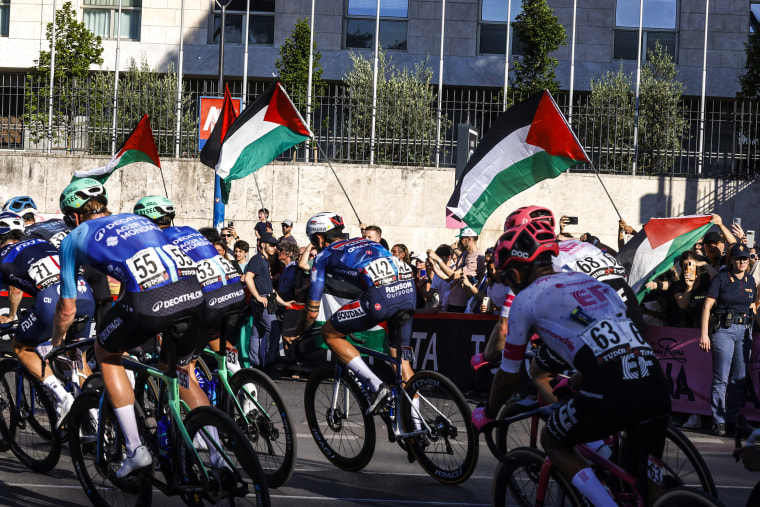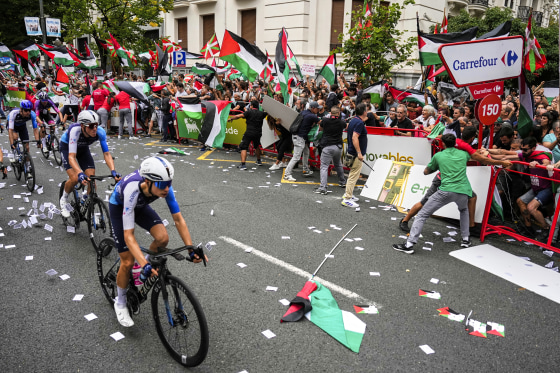Calls for an Israeli-owned professional cycling team to abandon Spain’s grand tour have overshadowed much of La Vuelta a España this week.
Pro-Palestinian protesters targeting Israel-Premier Tech lined up along the route in Bilbao, waving large Palestinian flags and signs that read, “Neutrality is complicity. Boycott Israel” and “La Vuelta continues deaf and dumb” in Catalan and Spanish, respectively.
They are protesting Israel's bombardment of Gaza, which has killed tens of thousands of civilians, in retaliation for Hamas' attack on Oct. 7, 2023.
Israel-Premier Tech's owner, Israeli-Canadian billionaire Sylvan Adams, has denounced the demonstrators as “violent terrorists” and said Israel-Premier Tech will remain in the race until it ends in Madrid on Sept. 14.
“Any other course of action sets a dangerous precedent in the sport of cycling — not only for Israel-Premier Tech, but for all teams,” the team said in a Wednesday statement.
The state of Israel does not sponsor the cycling team and just three of its 30 cyclists are Israeli, according to the official roster.
Adams, who was born in Canada, is a vocal supporter of Israeli Prime Minister Benjamin Netanyahu and refers to himself as “self-appointed ambassador-at-large for Israel." Last week, he said Israel was losing the "communications war" regarding the war in Gaza and has described his work with Israel-Premier Tech as a source of diplomacy.
"When my Israel cycling team is performing well in a big race, the television announcers might mention the word ‘Israel’ 150 times, always in a positive light," Adams said in a January interview with EU Reporter. "This is the way we can bring our good name to the majority of people."
On Friday, Netanyahu expressed his support for the team and Adams.
“Great job to Sylvan and Israel’s cycling team for not giving in to hate and intimidation. You make Israel proud,” Netanyahu wrote on X.
Representatives for Adams did not immediately return a request for comment.
His public statements have come under renewed scrutiny, as a growing chorus inside and outside the peloton call for Israel-Premier Tech to abandon the race.
Earlier this week, his sports director implied the team was apolitical and should be allowed to compete.
“We are a sports team and we don’t mix it up with politics," Israel-Premier Tech's Daryl Impey told reporters.
But at least one of the team's recently retired cyclists, who last rode for it on Aug. 17, suggested he was relieved to no longer be associated with Israel.
"I don’t want to get myself involved in what’s happening politically, but it’s definitely nicer to ride around without an Israel logo than with an Israel logo," Jakob Fuglsang told Danish reporters.
Inside the peloton, friction within the cycling community continues to escalate. Race technical director Kiko Garcia said earlier this week that he would be in favor of the Israeli-owned team withdrawing.
“Everyone needs to try to find a solution,” he told Spanish media. “For me right now is that the Israeli team realizes that by being here it doesn’t help the safety of everyone else. But we can’t make that decision, the team has to do it.”
On Thursday, Spain's foreign minister weighed in on the issue, saying he would support removing the team from the Vuelta.
“We have to send a message to Israel and the Israeli society that Europe and Israel can only have normal relations when human rights are respected,” José Manuel Albares told Spanish media.
Spain's left-wing government earlier this year announced it would formally recognize Palestine as a state.
Palestinian flags have become a regular sight along grand tour routes all season. They were prevalent throughout the Giro d’Italia and, to a lesser extent, at the Tour de France.

But during the Vuelta, which started on Aug. 23 in Italy, protests have become safety concerns. Last week, a small group of demonstrators interrupted Israel-Premier Tech’s team time trial by blocking the road with a large sign. The cyclists were briefly slowed down and the team was ultimately able to complete the stage.
Then on Wednesday in Bilbao, a region with a long history of political resistance, race organizers called off the remainder of that day’s competition some 6 miles from the finish line as some demonstrators jumped into the road and others attempted to push past barricades.
The abrupt cancellation denied gold medalist Tom Pidcock, of Q36.5 Pro Cycling Team, a dramatic face-off against two-time Tour de France winner Jonas Vingegaard, of Visma–Lease a Bike.
“It’s hard to describe the disappointment, to be honest,” Pidcock told reporters after the race. “I felt like today was my day. I feel like there should always be a finish line.”
The professional cycling governing body, Union Cycliste Internationale, condemned the Bilbao disruption, saying in a statement that “cycling in particular, has a role to play in bringing people together and overcoming barriers between them, and should under no circumstances be used as a tool for punishment.”
The previous day, Intermarché-Wanty’s Simone Petilli crashed during Stage 10, after demonstrators ran onto the course. In a statement posted to social media, he pleaded with protesters to consider the safety of riders.
“I understand that is not a good situation, but yesterday I crashed because of a Protest on the road,” he posted to X. “Please, we are just Cyclists and we are doing our Job.”
Cycling is uniquely susceptible to disruptions. Unlike most professional sporting events, tickets are needed only for certain high-profile portions of races. Fans are often seen freely running alongside riders and cheering them on from the side of the road.
Professional riders have both complained about and extolled this feature of cycling — with freedom comes certain security risks. Fans have been known to throw drinks at cyclists or accidentally cause crashes by getting too close to the course.
With 21 stages spanning four countries and 1,958 miles, patrolling the entirety of the Vuelta is impossible.
Basque Country did not host the Vuelta for more than 30 years until 2011, The Associated Press reported. That hiatus came after Basque separatists caused a stage to be canceled in 1978 when they rolled logs onto the course.

